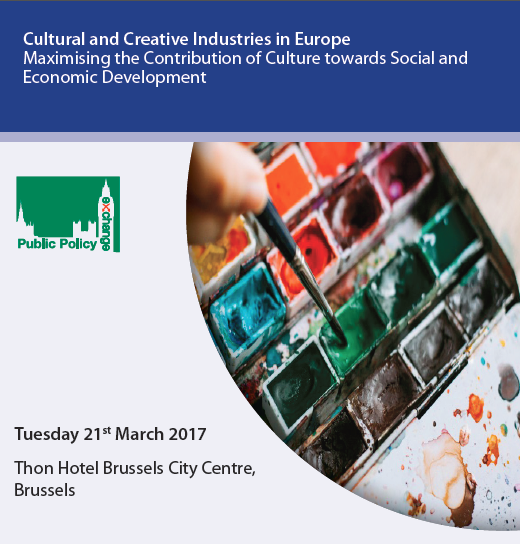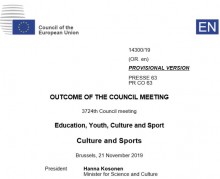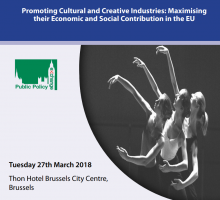 Culture represents an extensive economic asset and a valuable source of creativity and innovation. According to the European Parliament’s report on EU policy for cultural and creative industries (June 2016), Cultural and Creative Industries (CCIs) have become high-capacity engines for economic growth, representing 11.2% of all private enterprises and 7.5% of all employed persons. Beyond their significant economic contribution, CCIs have built a bridge between arts, culture, business and technology.
Culture represents an extensive economic asset and a valuable source of creativity and innovation. According to the European Parliament’s report on EU policy for cultural and creative industries (June 2016), Cultural and Creative Industries (CCIs) have become high-capacity engines for economic growth, representing 11.2% of all private enterprises and 7.5% of all employed persons. Beyond their significant economic contribution, CCIs have built a bridge between arts, culture, business and technology.
However, CCIs’ potential remains poorly exploited and is at risk of being compromised by changes in increased digital technologies, persistent economic instability, and considerable changes in the regulatory European framework. CCIs have moreover struggled to evidence the potential of their sector to investors and have suffered from legislative hindrances such as intellectual property rights and varying tax regimes.
To unlock the potential of CCIs, the European Commission has introduced initiatives such as the Creative Europe Programme with a total budget of €1.46 billion. This programme aims to stimulate cross-border cooperation among Small and Medium Enterprises (SMEs) in the cultural heritage sector, whilst supporting policy work undertaken in the 2015-2018 Work Plan for Culture. With the continuous evolution of the cultural and creative sectors, there is an increased need to support the expansion and skills development of professionals employed in the industry through greater improvements in education and training. Similarly, it is essential that we recognise and utilise the potential contribution of migration towards cultural enrichment and consider its integration in the CCIs.
This timely symposium will provide an opportunity to discuss ways to drive the development of cultural and creative industries in the EU and examine how cross-sector and cross-border collaborations can lead to a stronger and more competitive cultural sector. In addition to their economic value, this symposium will also explore the potential of cultural and creative industries to foster an inclusive European identity and support social cohesion.
Delegates will:
- Develop methods to further promote and safeguard cultural and creative industries at European level
- Explore means of unlocking the economic potential of cultural and creative industries
- Consider ways to boost innovation and develop synergies between education and culture
- Discuss the innovative aspects and social contribution of digitalized cultural heritage
- Share best practice in improving data collection on CCIs
- Scrutinise approaches to empowering local and regional economies
- Examine current funding opportunities for the CCI sector
Speakers:
- Marietje Schaake Member European Parliament
- Prof. Elisabetta Lazzaro Professor of Creative Economy HKU University of the Arts Utrecht
- Damien Helly Head of External Action Programme & Cultural Affairs Advisor ECDPM
- Clémentine Daubeuf Consultant KEA European Affairs
- Grégoire Polad Director General Association of Commercial Television in Europe
- Marie Le Sourd Secretary General On the Move
- Sophie Querton Co-Founder Refugees Got Talent
- Julia Wolny Chief Marketing Officer (CMO) SonicPaintings
- Sophie Querton Co-Founder Refugees Got Talent
- Andreas Ruhe Designer, Co-Founder Deaf Magazine
- Alexandros Michalakopoulos Designer, Co-Founder Deaf Magazine
More information and registration on EVENT’S PAGE
Download event’s flyer with detailed ageda (PDF, 904 Kb)






 If you have interesting news and events to point out in the field of digital cultural heritage, we are waiting for your contribution.
If you have interesting news and events to point out in the field of digital cultural heritage, we are waiting for your contribution.





















